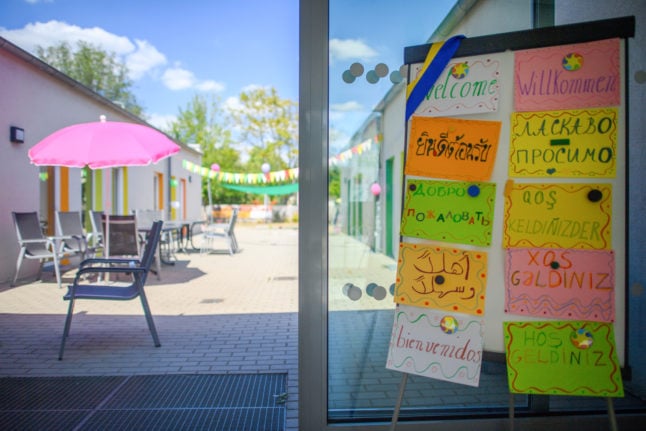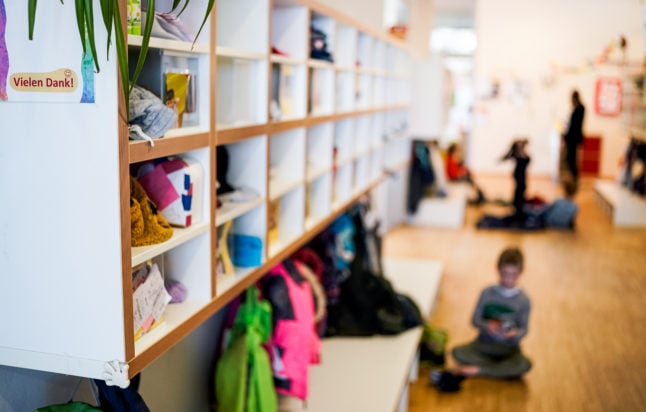How much does childcare cost across Germany?

When it comes to affordable childcare in Germany, it can be something of a postcode lottery. Here's what you need to know about the fees for Kitas in various German states.
Since 2013, every child over the age of one has had a legal right to partially subsidised state childcare in Germany. There are different types of day care options, from Kinderkrippen (nurseries) to Kindergärten (pre-schools), but they're all encapsulated under the umbrella term of Kita, which is short for Kindertagesstätte (child day care centre).
Unfortunately, having a right to a Kita place in theory isn't always the same as securing one in practice. Demand for childcare massively outstrips supply in Germany, so it's not unheard of for soon-to-be parents to even start making their enquiries during pregnancy.
The other thing to bear in mind is that Kita fees and government childcare subsidies are decided at a state level. To make matters even more complicated, these state decisions are implemented differently across different regions, meaning two sets of parents in two different cities in Baden-Württemberg could be paying completely different amounts for their childcare.
READ ALSO: EXPLAINED: Everything you need to know about parental leave in Germany
Here's a run-down of the main things to know about childcare costs in each of the federal states.
How much do I have to pay?
Bavaria
In Bavaria, the cost of childcare varies hugely from city to city and district to district. In Munich, for example, the amount of fees depends on the type of facility the child attends: care in a kindergarten (pre-school) is free, while nursery schools for younger children are not. However, parents with a joint annual income of less than €80,000 can apply for reduced fees.
Under a certain income limit, parents can also apply for the Bavarian day care allowance (Krippengeld). This is a contribution of €100 per month towards the cost of childcare for children over the age of one.

Parents drop their children off at nursery school. Photo: picture alliance/dpa | Klaus-Dietmar Gabbert
Baden-Württemberg
In Baden-Württemberg, parents shell out different amounts for childcare depending on where they live. In Heilbronn, for example, childcare is free from the age of three, while in Stuttgart, families pay fees that are partially linked to their income. Residents of the state capital with an annual income of up to €70,000 can receive a family card that reduces their childcare fees by around ten cents per hour. In other parts of the state, parents can be asked to cough up as much as €600 per month for childcare.
Berlin
Since August 2018, nurseries and day care centres in Berlin have been free of charge for all children, though parents are expected to pay a small contribution for the meals. Kitas are also allowed to charge extra for additional services such as special sports activities, organic food or language lessons, meaning costs can range anywhere between €30 and €90 per month.
Brandenburg
In Brandenburg, every child receives their last year of pre-school care for free. For younger children, parents are expected to pay a contribution towards lunches and the operating costs of the nurseries. These costs vary across the different districts and are also linked to parental income.
However, people receiving social welfare and those on low incomes can receive all their pre-school childcare for free.
Bremen
For parents living in Bremen, childcare is free between the ages of three and six, with parents only contributing to the cost of meals. For younger children, the cost of a place a nursery is dependent on a wide range of factors, including income, the number of children in the family and the scope of the care.
People receiving social benefits and BremenPass holders can get their childcare for free, regardless of the child's age.
READ ALSO: What foreign parents in Germany need to know about Sprach-Kitas
Hamburg
In Hamburg, care for five hours a day including lunch is free of charge for parents. Those who take advantage of more extensive care, i.e. daycare for six hours or more a day, pay a contribution that is graded according to income level, family size, age group and scope of care.
For a child receiving eight hours of care, the costs can range anywhere between €11 and €191, for example. You can calculate the costs of your childcare using this calculator on the state website.

A whiteboard with notes welcoming children to nursery school. Photo: picture alliance/dpa | Klaus-Dietmar Gabbert
Hessen
In the central state of Hesse, children between the ages of three and six get up to six hours of care a day for free. For younger children, fees vary from region to region. In Frankfurt, for example, parents can expect to shell out around €200 per month for a place at a nursery, as well as €30-50 for meals. In Wiesbaden, meanwhile, costs are linked to the duration and type of care required.
Lower Saxony
In Lower Saxony, children can get up to eight hours' free care a day from the age of three. For children under the age of three, fees are usually staggered and can depend on the district in question. In Hanover, for example, the childcare fee depends on the type of childcare and the parents' income. Parents also pay €30 a month to cover the cost of meals.
Mecklenburg Western-Pomerania
For lucky parents in the northeastern state of Mecklenburg, all childcare places in nurseries and day care centres are paid for by the government. Parents can take advantage of up to 10 hours of free childcare throughout the week without worrying about any eye-watering costs.
READ ALSO: 7 cultural differences between raising kids in Germany and the US
North-Rhine Westphalia (NRW)
In NRW, the last two years of a child's care before starting school are generally free of charge. For younger children, the local youth welfare office decides whether and to what extent parental contributions are levied for the use of services in day care centres or in day care for children.
Rhineland Palatinate
In this western state, parents can send their children to a nursery free-of-charge as soon as they turn two. Before that, childcare fees vary depending on the district.

Children play in the grounds of a German nursery school. Photo: picture alliance/dpa/mauritius images / Westend61 / M | Westend61 / Mareen Fischinger
Saarland
Unlike most other states, Saarland leaves decisions on nursery fees up to the individual institutions. Unsurprisingly, this makes the tiny western state one of the most expensive in Germany. In Saarbrücken, for example, parents can expect to shell out around €187 for a half-day place at a nursery and €368 for a full-day place, excluding meals.
Saxony-Anhalt
In Saxony-Anhalt, parents only pay childcare fees for their oldest child, and can apply for the fees to be waived (or partially waived) depending on their income. As a general rule, however childcare costs between €100-200 per month, with parents in Halle paying €165 a month for an eight-hour place in the nursery, and €119 euros for an eight-hour place in the kindergarten.
Saxony
In Saxony, too, the parental contribution towards childcare varies from region to region. However, the fees should not exceed 15-23 percent of the average municipal costs for a nursery place and 15-30 percent of the costs for a pre-school place. Children also receive their last year before school free-of-charge.
In Leipzig, the parental contribution is based on the number of children, whether the parent is a single parent, and the duration of care. Fees vary between €56.30 (second child, 20 hours per week) and €311.39 (first child, 55 hours per week). People on lower incomes can apply for various reductions. A full breakdown of the standard costs can be found here.
READ ALSO: 7 surefire signs your kids are definitely German

Children at a kita in Kiel, Schleswig-Holstein. Photo: picture alliance/dpa | Axel Heimken
Schleswig-Holstein
Since January 2022, childcare costs for parents in Schleswig-Holstein have been capped at €232 per month for eight hours of daily care at a nursery and €226 per month for eight hours of care at a kindergarten or pre-school. Parents pay half of this amount for a second child and there are no contributions from the third child onward.
While the amount parents pay generally isn't linked to income, people on benefits don't pay contributions at all and those on low incomes can apply for Kita Geld to help them with their childcare expenses.
Thuringia
In the state of Thuringia, the last year of Kindergarten has been free to families since 2018. And since mid-2020, the second last year before school is also free of charge. However, meal costs still have to be paid. Fees for other years depend on parents' income, the amount of care hours and the number of children receiving care among other factors.
Please note that our article is for guidance only and you should contact your local authority for more information.
Comments
See Also
Since 2013, every child over the age of one has had a legal right to partially subsidised state childcare in Germany. There are different types of day care options, from Kinderkrippen (nurseries) to Kindergärten (pre-schools), but they're all encapsulated under the umbrella term of Kita, which is short for Kindertagesstätte (child day care centre).
Unfortunately, having a right to a Kita place in theory isn't always the same as securing one in practice. Demand for childcare massively outstrips supply in Germany, so it's not unheard of for soon-to-be parents to even start making their enquiries during pregnancy.
The other thing to bear in mind is that Kita fees and government childcare subsidies are decided at a state level. To make matters even more complicated, these state decisions are implemented differently across different regions, meaning two sets of parents in two different cities in Baden-Württemberg could be paying completely different amounts for their childcare.
READ ALSO: EXPLAINED: Everything you need to know about parental leave in Germany
Here's a run-down of the main things to know about childcare costs in each of the federal states.
How much do I have to pay?
Bavaria
In Bavaria, the cost of childcare varies hugely from city to city and district to district. In Munich, for example, the amount of fees depends on the type of facility the child attends: care in a kindergarten (pre-school) is free, while nursery schools for younger children are not. However, parents with a joint annual income of less than €80,000 can apply for reduced fees.
Under a certain income limit, parents can also apply for the Bavarian day care allowance (Krippengeld). This is a contribution of €100 per month towards the cost of childcare for children over the age of one.

Baden-Württemberg
In Baden-Württemberg, parents shell out different amounts for childcare depending on where they live. In Heilbronn, for example, childcare is free from the age of three, while in Stuttgart, families pay fees that are partially linked to their income. Residents of the state capital with an annual income of up to €70,000 can receive a family card that reduces their childcare fees by around ten cents per hour. In other parts of the state, parents can be asked to cough up as much as €600 per month for childcare.
Berlin
Since August 2018, nurseries and day care centres in Berlin have been free of charge for all children, though parents are expected to pay a small contribution for the meals. Kitas are also allowed to charge extra for additional services such as special sports activities, organic food or language lessons, meaning costs can range anywhere between €30 and €90 per month.
Brandenburg
In Brandenburg, every child receives their last year of pre-school care for free. For younger children, parents are expected to pay a contribution towards lunches and the operating costs of the nurseries. These costs vary across the different districts and are also linked to parental income.
However, people receiving social welfare and those on low incomes can receive all their pre-school childcare for free.
Bremen
For parents living in Bremen, childcare is free between the ages of three and six, with parents only contributing to the cost of meals. For younger children, the cost of a place a nursery is dependent on a wide range of factors, including income, the number of children in the family and the scope of the care.
People receiving social benefits and BremenPass holders can get their childcare for free, regardless of the child's age.
READ ALSO: What foreign parents in Germany need to know about Sprach-Kitas
Hamburg
In Hamburg, care for five hours a day including lunch is free of charge for parents. Those who take advantage of more extensive care, i.e. daycare for six hours or more a day, pay a contribution that is graded according to income level, family size, age group and scope of care.
For a child receiving eight hours of care, the costs can range anywhere between €11 and €191, for example. You can calculate the costs of your childcare using this calculator on the state website.

Hessen
In the central state of Hesse, children between the ages of three and six get up to six hours of care a day for free. For younger children, fees vary from region to region. In Frankfurt, for example, parents can expect to shell out around €200 per month for a place at a nursery, as well as €30-50 for meals. In Wiesbaden, meanwhile, costs are linked to the duration and type of care required.
Lower Saxony
In Lower Saxony, children can get up to eight hours' free care a day from the age of three. For children under the age of three, fees are usually staggered and can depend on the district in question. In Hanover, for example, the childcare fee depends on the type of childcare and the parents' income. Parents also pay €30 a month to cover the cost of meals.
Mecklenburg Western-Pomerania
For lucky parents in the northeastern state of Mecklenburg, all childcare places in nurseries and day care centres are paid for by the government. Parents can take advantage of up to 10 hours of free childcare throughout the week without worrying about any eye-watering costs.
READ ALSO: 7 cultural differences between raising kids in Germany and the US
North-Rhine Westphalia (NRW)
In NRW, the last two years of a child's care before starting school are generally free of charge. For younger children, the local youth welfare office decides whether and to what extent parental contributions are levied for the use of services in day care centres or in day care for children.
Rhineland Palatinate
In this western state, parents can send their children to a nursery free-of-charge as soon as they turn two. Before that, childcare fees vary depending on the district.

Saarland
Unlike most other states, Saarland leaves decisions on nursery fees up to the individual institutions. Unsurprisingly, this makes the tiny western state one of the most expensive in Germany. In Saarbrücken, for example, parents can expect to shell out around €187 for a half-day place at a nursery and €368 for a full-day place, excluding meals.
Saxony-Anhalt
In Saxony-Anhalt, parents only pay childcare fees for their oldest child, and can apply for the fees to be waived (or partially waived) depending on their income. As a general rule, however childcare costs between €100-200 per month, with parents in Halle paying €165 a month for an eight-hour place in the nursery, and €119 euros for an eight-hour place in the kindergarten.
Saxony
In Saxony, too, the parental contribution towards childcare varies from region to region. However, the fees should not exceed 15-23 percent of the average municipal costs for a nursery place and 15-30 percent of the costs for a pre-school place. Children also receive their last year before school free-of-charge.
In Leipzig, the parental contribution is based on the number of children, whether the parent is a single parent, and the duration of care. Fees vary between €56.30 (second child, 20 hours per week) and €311.39 (first child, 55 hours per week). People on lower incomes can apply for various reductions. A full breakdown of the standard costs can be found here.
READ ALSO: 7 surefire signs your kids are definitely German

Schleswig-Holstein
Since January 2022, childcare costs for parents in Schleswig-Holstein have been capped at €232 per month for eight hours of daily care at a nursery and €226 per month for eight hours of care at a kindergarten or pre-school. Parents pay half of this amount for a second child and there are no contributions from the third child onward.
While the amount parents pay generally isn't linked to income, people on benefits don't pay contributions at all and those on low incomes can apply for Kita Geld to help them with their childcare expenses.
Thuringia
In the state of Thuringia, the last year of Kindergarten has been free to families since 2018. And since mid-2020, the second last year before school is also free of charge. However, meal costs still have to be paid. Fees for other years depend on parents' income, the amount of care hours and the number of children receiving care among other factors.
Please note that our article is for guidance only and you should contact your local authority for more information.
Join the conversation in our comments section below. Share your own views and experience and if you have a question or suggestion for our journalists then email us at [email protected].
Please keep comments civil, constructive and on topic – and make sure to read our terms of use before getting involved.
Please log in here to leave a comment.